Barbara Rainey's Blog, page 19
December 24, 2021
The Newborn Babe Is Lord of Lords


Have your children or you ever acted bossy over a younger brother or sister?
Were your parents heavy handed and authoritative?
Has a friend you thought was a friend actually been more of a master?
Maybe you played for a coach who acted like a dictator or a 5-star-general.
Our world is full of small kingdoms, small dominions ruled by small lords who control others to make themselves feel strong or powerful. We see them in alleyways, in schools, in workplaces, and even in churches. Often those who want to lord power over others are insecure, weak or fearful, yet they brandish authority in order to appear important and in control.
Yes, God has given us institutions with leaders for our good. But sadly those in positions of authority too often create their own little kingdoms at their followers’ expense.
But this kind of rule is not like our God.
In 1 Timothy 6:15, the apostle Paul describes Jesus as “the King of kings and Lord of lords.” Note that “Lord of lords” is paired with “King of kings” because they are inseparable like two sides of a coin. Jesus could not be King over all if He is not Lord over all.
Jesus is not like any of lord we experience in life which is why He is named Lord of all lords.
He is infinitely superior because He is perfect in every attribute, therefore His rule is perfect and always good and in love.
Jesus, sent from God, came to rescue and release us from the domain of darkness. When we make Him Lord of our lives we are set free from our destiny with spiritual eternal death and are placed in Him where “we have redemption through his blood, the forgiveness of our trespasses, according to the riches of his grace, which he lavished upon us … ”(Ephesians 1:7-8).
An engraved invitation, stamped with the seal of the King, waits with your name on it. In His limitless love and grace this invitation is always extended to you. The King of kings and Lord of Lords waits with patience for your response.
But the time is near for His return to earth and one day it will be too late to respond to His invitation. Jesus said, “Behold, I am coming soon, bringing my recompense with me, to repay everyone for what he has done” (Revelation 22:12)
This Christmas will you receive His gift?
Will you make Him your Lord?
The One who “on his robe and on his thigh he has a name written, King of kings and Lord of lords” (Revelation 19:16) is coming soon. May you and yours belong to the kingdom and lordship of Jesus Christ!
Merry Christmas!
This is part of a five-part series on the names of Jesus. Here are the other four posts in the series:
“The Newborn Babe Is the Lion of Judah”
“The Newborn Babe is the Savior”
“The Newborn Babe is the Mediator”
“The Newborn Babe is the Son of David”
The post The Newborn Babe Is Lord of Lords appeared first on Ever Thine Home.
The Newborn Babe is Lord of Lords


Have your children or you ever acted bossy over a younger brother or sister?
Were your parents heavy handed and authoritative?
Has a friend you thought was a friend actually been more of a master?
Maybe you played for a coach who acted like a dictator or a 5-star-general.
Our world is full of small kingdoms, small dominions ruled by small lords who control others to make themselves feel strong or powerful. We see them in alleyways, in schools, in workplaces, and even in churches. Often those who want to lord power over others are insecure, weak or fearful, yet they brandish authority in order to appear important and in control.
Yes, God has given us institutions with leaders for our good. But sadly those in positions of authority too often create their own little kingdoms at their followers’ expense.
But this kind of rule is not like our God.
In 1 Timothy 6:15, the apostle Paul describes Jesus as “the King of kings and Lord of lords.” Note that “Lord of lords” is paired with “King of kings” because they are inseparable like two sides of a coin. Jesus could not be King over all if He is not Lord over all.
Jesus is not like any of lord we experience in life which is why He is named Lord of all lords.
He is infinitely superior because He is perfect in every attribute, therefore His rule is perfect and always good and in love.
Jesus, sent from God, came to rescue and release us from the domain of darkness. When we make Him Lord of our lives we are set free from our destiny with spiritual eternal death and are placed in Him where “we have redemption through his blood, the forgiveness of our trespasses, according to the riches of his grace, which he lavished upon us … ”(Ephesians 1:7-8).
An engraved invitation, stamped with the seal of the King, waits with your name on it. In His limitless love and grace this invitation is always extended to you. The King of kings and Lord of Lords waits with patience for your response.
But the time is near for His return to earth and one day it will be too late to respond to His invitation. Jesus said, “Behold, I am coming soon, bringing my recompense with me, to repay everyone for what he has done” (Revelation 22:12)
This Christmas will you receive His gift?
Will you make Him your Lord?
The One who “on his robe and on his thigh he has a name written, King of kings and Lord of lords” (Revelation 19:16) is coming soon. May you and yours belong to the kingdom and lordship of Jesus Christ!
Merry Christmas!
The post The Newborn Babe is Lord of Lords appeared first on Ever Thine Home.
December 23, 2021
The Newborn Babe Is Our Mediator


One of the biggest challenges in parenting is sibling rivalry. Without question it was the most difficult part of parenting for us. Period. It is as old as Adam and Eve who saw their first two sons compete so strongly that Cain killed Abel. It’s been with us all ever since. So …
What do squabbling brothers or sisters need?
What do playground disputes need?
Who is often called when adults need help solving problems?
What is the name of the person hired to resolve rivalry issues in businesses or churches or marriages?
A mediator.
From professionals like lawyers and judges whose job is to solve disputes and problems to hard working yet beleaguered moms and dads, all of us need a mediator, a peacemaker. We all need someone to step in and resolve difficult problems.
1 Timothy 2:5 tells us, “For there is one God, and there is one mediator between God and men, the man Christ Jesus.” This is what Jesus has done on our behalf—as our Mediator He came to earth to bring us back to His Father, to resolve our differences, to bridge the gap between us. Without His intercession we could not make peace with God whom we have offended.
How have we offended God? Simply and profoundly by our selfishness, our sin, and our pride. Once Adam and Eve disobeyed God in the Garden of Eden, every person ever born is infected with the disease of self-centeredness. As a result, our natural bent is to want our own way rather than the perfect way of our Father.
Jesus is named the Mediator of a new covenant, or agreement, “that those who are called may receive the promised eternal inheritance” (Hebrews 9:15). By accepting Jesus as our Mediator, our debts to God are cancelled, our opposition to God is removed, and our distance to God bridged.
He has opened a new and living way for us to draw near to the throne of God! On the day we die and appear in heaven, Jesus will say to the Father, “Mine. I paid for this one.” The gates will swing wide; we will be welcomed into eternal happiness, because Jesus the Mediator has made us right with God!
Will you thank Him today that He has mediated your right standing with God the ruler of the universe?
This Christmas will you remember to thank Him every day for coming to earth on your behalf?
His mediation is the reason we can celebrate with extravagance!
The post The Newborn Babe Is Our Mediator appeared first on Ever Thine Home.
December 22, 2021
The Newborn Babe Is the Son of David

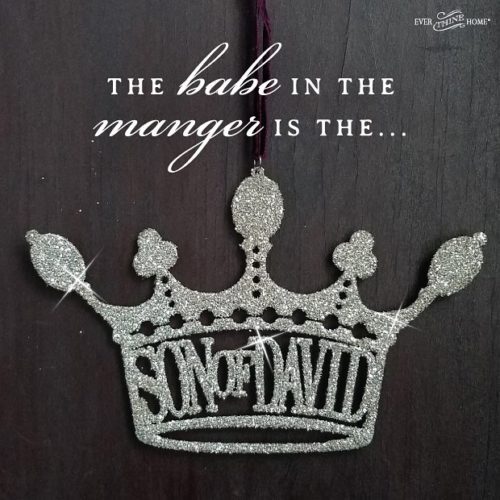
Does your family have traditions that have been passed down for generations?
At our house these traditions included reading the Christmas story and placing the manger scene in the most prominent place in the house, with the kids always arguing over who got to place baby Jesus in the center where He was worshiped by all.
Our traditions also included making my mother’s cutout Christmas butter cookies and pecan tassies while playing Christmas carols. Baking together as a family ensured Christmas was the same comforting experience as always.
Knowing that generations in your family and believers around the world have celebrated the glorious truth of Christmas morning makes our celebrations today richer. But what if you could prove your ancestors were royalty, how would you feel? A little taller? More important perhaps?
For centuries, the Jewish people have kept meticulous genealogical records to prove their ancestry and to watch for the promised King who would one day deliver them and rule in righteousness.
One genealogy started with young David, a boy who lived with sheep, slept out in the open, and felt more comfortable in the hills and valleys surrounding his hometown, Bethlehem, than in its streets. His seven older brothers were well known in the region of Judah. But David was seldom seen because of his duties pasturing his father’s flocks.
At just the right time though, God called David from obscurity and anointed him king over His people Israel. Soon after, David killed Goliath, began to lead men into battle defeating Israel’s foes, and years later received from God a very important pronouncement that his throne would last forever. Only a son of David could be the future king of God’s people.
One thousand years later, Matthew wrote an eyewitness account of the life of Jesus. In his first sentence he wrote, “The book of the genealogy of Jesus Christ, the son of David, the son of Abraham” (Matthew 1:1). Declaring Jesus to be the Son of David was significant. It was a title of profound meaning. Every Jewish family knew that the future king and Messiah would come from David’s line: a man born to one of his descendants.
Not only did the record books prove Jesus’ direct connection to King David, but many who lived in His day recognized Jesus as the Son of David.
A woman who wasn’t Jewish, who should not have known the prophesies of a coming son of David, came to find Jesus and begged Him to heal her daughter. “Lord, Son of David,” she called Him (Matthew 15:22).Two blind men, who saw with clarity that Jesus was sent from God with the ability to heal, called him, “Lord, have mercy on us, Son of David!” (Matthew 20:30).Even children, especially little ones, understood the truth about this person named Jesus and they weren’t afraid to say so, shouting, “Hosanna to the Son of David!” (Matthew 21:15).Though Jesus was genetically linked to David, He was more than any human king. Only God can give sight to the blind and raise the dead to life.
Jesus was divine.
Jesus was the forever Heir to David’s throne.
Will you be so bold to declare who Jesus is this week as your family prepares for Christmas? Share the truth of His lineage and prophesy fulfilled with your family so that they know the significance of the one we worship and receive in a few days on Christmas morning.
Remember, Jesus came to rule a kingdom of hearts.
Will you be like the children who proclaimed him Son of David? Is He king of your life and your heart?
You can invite Him in this Christmas.
This is part of a five-part series on the names of Jesus. Be sure to read the other four parts:
“The Newborn Babe Is the Lion of Judah”
“The Newborn Babe is the Savior”
“The Newborn Babe is the Mediator”
“The Newborn Babe is Lord of Lords”
The post The Newborn Babe Is the Son of David appeared first on Ever Thine Home.
The Newborn Babe is the Son of David


Does your family have traditions that have been passed down for generations?
At our house these traditions included reading the Christmas story and placing the manger scene in the most prominent place in the house, with the kids always arguing over who got to place baby Jesus in the center where He was worshiped by all.
Our traditions also included making my mother’s cutout Christmas butter cookies and pecan tassies while playing Christmas carols. Baking together as a family ensured Christmas was the same comforting experience as always.
Knowing that generations in your family and believers around the world have celebrated the glorious truth of Christmas morning makes our celebrations today richer. But what if you could prove your ancestors were royalty, how would you feel? A little taller? More important perhaps?
For centuries, the Jewish people have kept meticulous genealogical records to prove their ancestry and to watch for the promised King who would one day deliver them and rule in righteousness.
One genealogy started with young David, a boy who lived with sheep, slept out in the open, and felt more comfortable in the hills and valleys surrounding his hometown, Bethlehem, than in its streets. His seven older brothers were well known in the region of Judah. But David was seldom seen because of his duties pasturing his father’s flocks.
At just the right time though, God called David from obscurity and anointed him king over His people Israel. Soon after, David killed Goliath, began to lead men into battle defeating Israel’s foes, and years later received from God a very important pronouncement that his throne would last forever. Only a son of David could be the future king of God’s people.
One thousand years later, Matthew wrote an eyewitness account of the life of Jesus. In his first sentence he wrote, “The book of the genealogy of Jesus Christ, the son of David, the son of Abraham” (Matthew 1:1). Declaring Jesus to be the Son of David was significant. It was a title of profound meaning. Every Jewish family knew that the future king and Messiah would come from David’s line: a man born to one of his descendants.
Not only did the record books prove Jesus’ direct connection to King David, but many who lived in His day recognized Jesus as the Son of David.
A woman who wasn’t Jewish, who should not have known the prophesies of a coming son of David, came to find Jesus and begged Him to heal her daughter. “Lord, Son of David,” she called Him (Matthew 15:22).Two blind men, who saw with clarity that Jesus was sent from God with the ability to heal, called him, “Lord, have mercy on us, Son of David!” (Matthew 20:30).Even children, especially little ones, understood the truth about this person named Jesus and they weren’t afraid to say so, shouting, “Hosanna to the Son of David!” (Matthew 21:15).Though Jesus was genetically linked to David, He was more than any human king. Only God can give sight to the blind and raise the dead to life.
Jesus was divine.
Jesus was the forever Heir to David’s throne.
Will you be so bold to declare who Jesus is this week as your family prepares for Christmas? Share the truth of His lineage and prophesy fulfilled with your family so that they know the significance of the one we worship and receive in a few days on Christmas morning.
Remember, Jesus came to rule a kingdom of hearts.
Will you be like the children who proclaimed him Son of David? Is He king of your life and your heart?
You can invite Him in this Christmas.
The post The Newborn Babe is the Son of David appeared first on Ever Thine Home.
December 20, 2021
The Newborn Babe Is Our Savior

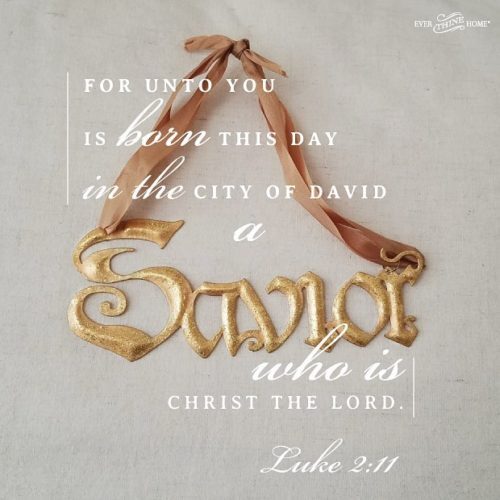
In most tragedies you’ll find a story about a savior.
During mass shootings there are people who protect others with their bodies, or people who try to overpower the shooter, and always people who step in to stop the bleeding and keep injured victims alive. After tornadoes someone always steps up to rescue the trapped, to hold someone’s hand, to pray. Often unnamed, these men and women are doing what Jesus did and still does for us: provide saving help.
The greater tragedy today is too many of us, even many who claim to know Jesus, are unaware that we are bleeding and broken, in need of Jesus’ daily saving grace and mercy and power. We try to cover our inadequacies, our failures, our gaping wounds with performance, power, and addictions of all kinds instead of going first to our Savior. By His amazing grace and love He chose instead to come to us first.
Those in the Old Testament who believed knew God was their Savior, for He told them plainly, “I, I am the LORD, and besides me there is no savior” (Isaiah 43:11).
But on a cold dark night this name, Savior, was given to a real in the flesh baby lying unnoticed in a feeding trough.
Stunned shepherds heard a startling nighttime birth announcement delivered by an angel who stood before them surrounded by light as bright as the sun:
“Fear not, for behold, I bring you good news of great joy that will be for all the people. For unto you is born this day in the city of David a Savior, who is Christ the Lord.”
The delivery was unlike any birth announcement we get in the mail declaring name, date and weight, yet the angelic announcement did reveal the baby’s name: Savior. These Jewish men and boys—whose lives were rough, dirty and lonely —were told a name they understood to mean Messiah, the long awaited and promised rescuer of their people
What kind of Savior did the shepherds need? What kind of Savior do you need need?
Consider that the very first people who lived on earth were also the first ones to need a Savior.
Adam and Eve chose their own way over God’s way and became forever trapped in bondage to a body that would die instead of living forever. You and I are their children, alive in bodies that are broken by sin and utterly unable to reach God’s standard of holiness.
But because God loves us He sent Jesus to be our Savior!
Celebrate your salvation today and may your joy be great on Christmas Day!
This is the second of a five-part series. Click here to read yesterday’s post, “The Newborn Babe Is the Lion of Judah.”
The post The Newborn Babe Is Our Savior appeared first on Ever Thine Home.
December 19, 2021
The Newborn Babe Is the Lion of Judah

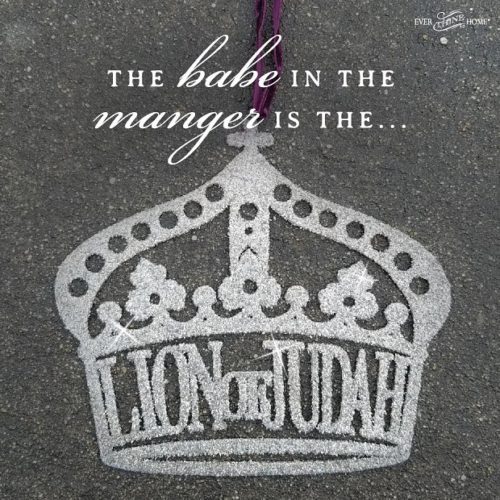
Have you ever seen a lion at the circus or in a zoo? They appear docile and obedient. The trainers and keepers can feel brave with the familiarity of proximity to these great animals. But in a split second, the lion’s ear-piercing roar reminds everyone who is really in charge.
The king of the jungle is fast and brave. He quietly stalks his prey, waiting for the right moment to pounce and attack. His powerful, angry roar announces that he is a beast to be feared and no one is safe in the lion’s presence, in his territory.
But what if a lion was on your side? Could there be safety beneath those powerful paws?
This is Jesus, the Lion of Judah.
The first mention in the Bible of this lion who will rule is in Genesis 49:9-10, when Jacob speaks his dying blessing to each of his twelve sons. To Judah he says, “Judah is a lion’s cub … The scepter shall not depart from Judah … ”
A scepter is a rod often made of gold and encrusted with jewels, which a king extends toward anyone seeking his favor or blessing. It is a symbol of kingship, a symbol of his authority over every person in his realm. Jacob predicts Judah’s coming royalty.
But Jacob’s words to Judah were not for him alone. After he spoke of the scepter, Jacob hinted about a future descendant: “ … nor the ruler’s staff from between his feet, until tribute comes to him; and to him shall be the obedience of the peoples.” One day a son many generations future will receive the tribute of nations and the obedience of all people. It was a prediction both of David’s reign and the greater kingdom of Christ.
Leaving Genesis and skipping to Revelation, the Lion of Judah appears in John’s vision of the end times. Peering into heaven John sees a sealed scroll in the right hand of God, but no one can answer the angel’s call to open it. John begins to weep because no one was worthy. Then one of the elders spoke, “Weep no more; behold, the Lion of the tribe of Judah the Root of David, has conquered so that He can open the scroll and its seven seals” (Revelation 5:5).
Jesus, the Lion of Judah, the majestic powerful fearless one, has conquered sin and death. Therefore He is qualified. He alone is worthy. As Jesus steps forward to take the scroll and open it, He appears as a Lamb (Revelation 5:6-7). All in heaven fall prostrate before Him.
With great power, influence, and authority, Jesus acts on behalf of His children. He is fierce and frightening, fighting against the devil’s schemes. He lies low in the grass, waiting to ambush our enemy, His prey, and rescue us at just the right time.
What comfort we find in knowing the swift, patient, and proud Lion of Judah, the king of the world, is ferocious for us. As the famous hymn proclaims,
“Lead on O King eternal,
till sin’s fierce war shall cease,
and holiness shall whisper
the sweet amen of peace.
For not with swords’ loud clashing,
or roll of stirring drums,
with deeds of love and mercy,
the heavenly kingdom comes.”
May you and yours welcome this Lion of Judah to your home this Christmas week.
And may you worship Him for all He has done for you.
The post The Newborn Babe Is the Lion of Judah appeared first on Ever Thine Home.
The Newborn Babe is the Lion of Judah


Have you ever seen a lion at the circus or in a zoo? They appear docile and obedient. The trainers and keepers can feel brave with the familiarity of proximity to these great animals. But in a split second, the lion’s ear-piercing roar reminds everyone who is really in charge.
The king of the jungle is fast and brave. He quietly stalks his prey, waiting for the right moment to pounce and attack. His powerful, angry roar announces that he is a beast to be feared and no one is safe in the lion’s presence, in his territory.
But what if a lion was on your side? Could there be safety beneath those powerful paws?
This is Jesus, the Lion of Judah.
The first mention in the Bible of this lion who will rule is in Genesis 49:9-10, when Jacob speaks his dying blessing to each of his twelve sons. To Judah he says, “Judah is a lion’s cub … The scepter shall not depart from Judah … ”
A scepter is a rod often made of gold and encrusted with jewels, which a king extends toward anyone seeking his favor or blessing. It is a symbol of kingship, a symbol of his authority over every person in his realm. Jacob predicts Judah’s coming royalty.
But Jacob’s words to Judah were not for him alone. After he spoke of the scepter, Jacob hinted about a future descendant: “ … nor the ruler’s staff from between his feet, until tribute comes to him; and to him shall be the obedience of the peoples.” One day a son many generations future will receive the tribute of nations and the obedience of all people. It was a prediction both of David’s reign and the greater kingdom of Christ.
Leaving Genesis and skipping to Revelation, the Lion of Judah appears in John’s vision of the end times. Peering into heaven John sees a sealed scroll in the right hand of God, but no one can answer the angel’s call to open it. John begins to weep because no one was worthy. Then one of the elders spoke, “Weep no more; behold, the Lion of the tribe of Judah the Root of David, has conquered so that He can open the scroll and its seven seals” (Revelation 5:5).
Jesus, the Lion of Judah, the majestic powerful fearless one, has conquered sin and death. Therefore He is qualified. He alone is worthy. As Jesus steps forward to take the scroll and open it, He appears as a Lamb (Revelation 5:6-7). All in heaven fall prostrate before Him.
With great power, influence, and authority, Jesus acts on behalf of His children. He is fierce and frightening, fighting against the devil’s schemes. He lies low in the grass, waiting to ambush our enemy, His prey, and rescue us at just the right time.
What comfort we find in knowing the swift, patient, and proud Lion of Judah, the king of the world, is ferocious for us. As the famous hymn proclaims,
“Lead on O King eternal,
till sin’s fierce war shall cease,
and holiness shall whisper
the sweet amen of peace.
For not with swords’ loud clashing,
or roll of stirring drums,
with deeds of love and mercy,
the heavenly kingdom comes.”
May you and yours welcome this Lion of Judah to your home this Christmas week.
And may you worship Him for all He has done for you.
The post The Newborn Babe is the Lion of Judah appeared first on Ever Thine Home.
December 13, 2021
How to Remember Jesus on Christmas Morning: An Easy 10 Minute Idea


Have you been tempted to lose the celebration of Christ’s birth in a swirl of fairy tales and merchandising? Have you trivialized the stunning miracle of God becoming human with toys, tinsel, and shopping trips in a frenzy of preparation for Christmas morning?
You might have started strong with weekly Advent readings with your family, but the tradition and dedication faded as the to-do lists got longer and the days shorter. You are not alone.
We’ve all been there … We get so focused on spreading clean sheets on guest beds, or taping glittered paper edges just right to hide the gift, or getting those first pies in the oven, that we lose sight of the real Christmas.
You haven’t failed.
Here’s an easy, 10-minute idea for Christmas morning. You can still make Christmas memorable and about Jesus.
Gather around the tree as usual. But before the kids tear into the carefully-taped paper, start with the most important gift. Designate a gift drop spot for Jesus.
Guide your family in first honoring Jesus for His willingness to come to earth. Remind them that He came to earth knowing His destiny was a cruel, brutal death.
Read the story in Luke 2:1-21 or Matthew 2:1-12. Point out that those who first worshiped Christ came to Him in faith before He had accomplished anything on earth. It was not because of the miracles He was yet to perform, or any gifts He might give. They simply worshiped Him because He had come, as promised. He was the long-awaited Messiah.
God desires that, like the magi and shepherds, we bow before Him and surrender our hearts and our lives to Him. Explain to your family that Jesus wants us for Christmas!

Encourage everyone gathered this Christmas morning to again give their hearts to Jesus. Have strips of paper ready for anyone who’d like to write or draw a gift to Jesus. Allow time for them to drop the paper gift in Jesus’ spot.
Save all these letters, notes, and gifts to Jesus as a valuable record of the growing faith in the hearts of each family member. The toys and trinkets will fade but hearts given to Him grow in value to become as Peter said, “more precious than gold” (1 Peter 1:7).
We hope you and your family have a wonderful and memorable Christmas!
If you enjoyed this post by Barbara, check out some additional posts about the true purpose of Christmas:
“Advent” “The Incarnation”
The post How to Remember Jesus on Christmas Morning: An Easy 10 Minute Idea appeared first on Ever Thine Home.
December 6, 2021
Parenting Children With Visible and Invisible Limitations
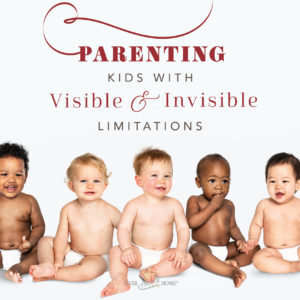
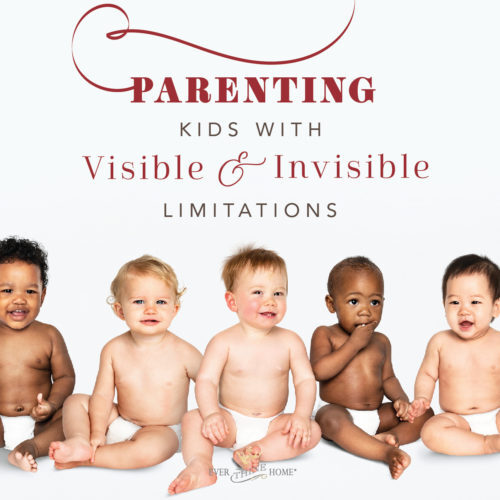
Of our two sons, one was more athletic, while the other was more scholastically inclined. The younger one’s first word was, “ball.” The older one started reading before age five. They could not be more different.
Instead of playing basketball for hours on the court Dennis built for the boys (because that’s what he did in his childhood), Samuel found a tennis racket and began hitting balls against the brick wall underneath the basket. It became clear he’d found his sport.
We enrolled him in lessons and then in competitions. By early seventh grade he was ranked in the state and playing for number one status in his age division. In a tournament to determine new rankings, Samuel almost had his opponent beat, but missed one point and then on the next serve lost the match. He was disappointed, of course, but we hoped this was just the beginning. Parents dream big for their kids!
That day was indeed the beginning. But it was not the start of a dream tennis career.
A couple weeks later Samuel’s coach asked to speak to me when I picked him up after his lessons. He explained that Samuel wasn’t getting to balls he used to return with ease. “Something’s not right,” he said.
Immediately I lined up appointments for our son. The early diagnosis was unclear, so we went to Mayo Clinic, where neurologists confirmed Samuel had Charcot-Marie-Tooth, a slow deterioration of the nerves to the lower legs.
After returning home Samuel wanted to keep playing tennis and I agreed 100 percent. I designed a pair of tennis shoes with elastic support from ankle to toe to help him lift his feet so he could run and not fall as often. But six months later it was clear he would never run again.


I’ll never forget the grief and heartbreak. Dennis and I went for a walk the day the truth finally became clear to me. Five minutes into the walk I sat on a log, fell forward into a fetal position, and cried uncontrollably, with groans from a place so deep within I never knew it existed.
Learning to adjust
For the next six months or longer Dennis and I mourned. Our athletic son had lost his greatest strength. He never liked school and now it was worse. In his own grief he struggled even more in class. As our most active kid he started getting in trouble.
We knew he was mourning, but what 13-year-old knows how to process catastrophic loss? We didn’t know how to help him either. It’s impossible to prepare for something like this. So, we leaned on God, prayed constantly, asked for wisdom, made mistakes, talked to those wiser and more skilled, and trusted God to use this tragedy for good in ways impossible to see in the moment.
As the months moved slowly forward we wondered how Samuel would handle high school. Would he go to college? Would he ever get married? What kind of career could he have? Would he be confined to a wheelchair one day? And most of all we wondered what God was doing and what He had planned by giving our son a real incurable life-altering physical disability.

All parents have high hopes for their children. We want life to be easy for them. We want a pain-free existence as much as is possible. We desire all these things because our children are extensions of us. “Every child is a piece of his mother’s heart walking around outside her body,” said author Jean Fleming. And it is true. Even today when my children suffer or are in pain I feel it as if it was my own.
When Samuel was diagnosed Dennis and I both longed to give him our legs. Dennis even asked if there was a transplant surgery of some kind. We would have sacrificed happily because we love our son enough to give our lives for him.
Limitations are common to all
We don’t have just one child with a disability. Our oldest daughter is dyslexic. Our adopted daughter, though not diagnosed with a disability still had her own very real obstacles through no fault of her own. Our other three have no official diagnosis but are none-the-less limited by DNA deficiencies and by relation to Adam and Eve.
My brother’s son is autistic. Another nephew is on the spectrum. A dear friend’s son at 21 is living with ulcerative colitis which greatly limits his lifestyle as an otherwise healthy young man. My daughter Laura’s best friend has a son with Down syndrome. Another friend’s daughter has three children, all diagnosed with the rare condition PANS.
Even the most intelligent among us may be geniuses or near genius but lack ordinary common sense. Like one of Dennis’s professors at Dallas Theological Seminary who had a photographic memory but forgot that he had driven his car to a speaking engagement in Houston. Afterward, he left the hotel, taxied to the airport and flew home. When he arrived he phoned his wife to come get him and she asked what he did with the car! C.S. Lewis also had a photographic memory but struggled with spelling his whole life. Go figure.
But the whole truth is that all of us are born with multiple limitations. We have no idea how much we lost in terms of intelligence, our five senses, physical and emotional abilities when Adam and Eve “fell.” All of humanity is “disabled” in some way. As I learned from my sister-in-law disabilities are really diff-abilities; different abilities.
The most important point of this entire post is this: None of your children or grandchildren are without disabilities. All of them have limitations, and this is good. Recognizing our own flaws and helping our children recognize theirs is an important step to acknowledging our need for a savior.
The greatest tragedy of all is not being born with a disability but living without knowing one’s brokenness and need for the Savior, Jesus Christ.
A single mom wrote about all that her 16-year-old son was missing since his father had died, summarizing: “Such are the children of the kingdom of God—all are missing arms or limbs, all are cracked vessels. Out of such raw material God is pleased to build His kingdom, the better to show the power is from Him.” Paul taught that we are all jars of clay, formed from dirt. All by God’s good design.
Here are six ways to embrace and give thanks for the disabilities and weaknesses God has woven into your children for their good and His glory.
1. Pray that your children would know they are sinners in need of Jesus. This was one of my frequent prayers for my children. I was especially concerned for my oldest and my youngest who were both people pleasers. They didn’t rebel much or instigate sibling rivalry. I knew they could be deceived into thinking they were good on their own merit. And Satan would work to convince them of that.
Our sin nature is so quick to defend our own perceived goodness and to measure ourselves against others who appear to be inferior than we. That was my own story. My three brothers were always fighting and getting into trouble. To avoid my father’s displeasure and occasional anger I was the good girl and never did anything to rock the boat.
Though I was eager to receive Christ as a college student, it was not because I felt sinful. In my own view I was not really “wicked and depraved” as the Bible declared. It wasn’t until my 40s that I saw the depth of my own depravity and was convinced how desperately I needed Jesus’ sacrifice on the cross for my sins.
“None is righteous, no, not one; no one seeks for God. … no one does good, not even one,” Paul wrote in Romans 3:10-12. Believe it and pray your children believe it too.
2. Give thanks for every limitation and disability you discover and teach your children to do the same. God commands us to “give thanks in all circumstances; for this is the will of God in Christ Jesus for you” (1 Thessalonians 5:18). Embrace God’s design. He knows what He’s doing and He has beautiful plans for your child’s life.
3. Beware of constantly telling your children they can do anything and be anything they want. This may surprise you because everyone today believes this, but it’s not wise or biblical parenting. The truth is your children can’t do or be anything they want. God has given them limitations on purpose to help guide them to His good and perfect plan and design.
An important part of your job as a parent is helping your children learn how to discern God’s directions for their lives. A favorite verse of mine is Ephesians 2:10, which says, “For we are His workmanship, created in Christ Jesus for good works, which God prepared beforehand …”
4. Teach them to look for His design for their lives, not to find their own way. God their Maker wants to use the talents, desires, and yes, the disabilities He has given in ways that He has planned. Teach them to work with God and how He has crafted them. Remind them, “Your hands have made and fashioned me” (Psalm 119:73). And pray they will not be lured by the culture into thinking they know better than God. Sadly, too many children and adults today strive in thousands of ways to be all they imagine, many with tragic results.
5. Teach your children and grandchildren that no one is perfect except Jesus. It’s another trap of our present culture to strive for perfection in our looks, our image, our identity, our jobs, our families, and more. The pressure is killing people. Literally. The sooner we acknowledge we are fallen and will never find perfection on our own, the sooner we will release the pressure and turn to Jesus. “There is salvation in no one else …” Peter declared in Acts 4:12.
6. Remember God delights to show His power and glory. John 9 tells an amazing story for our instruction. Jesus passed by a man born blind and the disciples asked whose fault it was, supposing there was a logical human explanation. But Jesus replied “It was not that this man sinned, or his parents, but that the works of God might be displayed in him” (John 9:3). Jesus then healed this man and all who saw glorified and worshipped Him.
So too in our lives God has plans and purposes that will reveal His miraculous power and care for us that we might glorify and worship Him.
God causes good
Through our own children and from watching others with disabilities, I’ve learned the pains and losses from these “gifts” that we would change or wish away are the very things God wants to use to purify, strengthen, and mold our kids into His image.
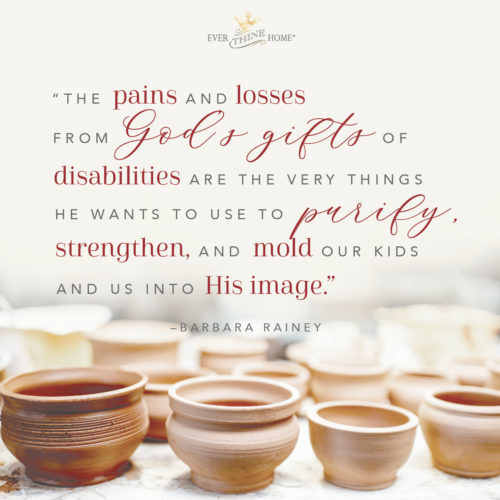
On the Wednesday before Thanksgiving 2015, Samuel and his family came early for some time with Dennis and me before we gathered with extended family the next day. He and his four kids and wife wanted to hike Pinnacle Mountain near our home; at 1,000 feet it’s small by western standards, but it is still a challenging hike, especially near the top. Samuel has surprised doctors over the years with his remaining ability. He wears titanium leg braces, has learned to play golf and is able to walk normal distances. On this day he wanted to climb Pinnacle.
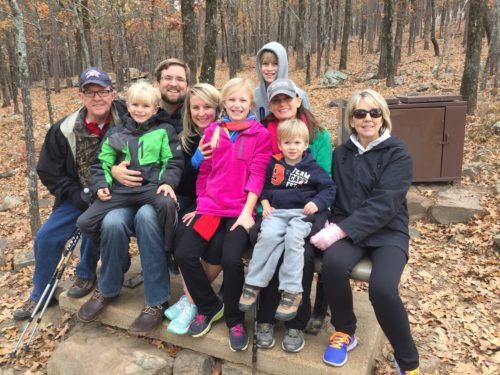
With his well-used walking sticks he kept up on the lower part of the trail without too much difficulty. But as we climbed higher the ascent proved more difficult. I’ll never forget his oldest son, who was 12, choosing to position himself a couple steps behind and below his dad. Peterson was paying attention not to his own enjoyment but to his dad and his difficulty negotiating the trail.
Finally, we arrived at the boulder field, the last section before the summit, and Samuel knew he couldn’t finish. He sat on a rock and his youngest son joined him. He sent the rest of us to the top, enjoying the satisfaction that he’d made it as far as he did. He was grateful and didn’t focus on what he couldn’t do.
Samuel is a godly man, a great husband and father, and by training and occupation an outstanding marriage and family therapist. (I’m biased but I know it’s true. We hear reports.) He is also a speaker with his wife, Stephanie, at Weekend to Remember marriage getaways. There is no question in my mind and heart that God purposed his disability to form a man of great compassion, understanding, and wisdom.
I also believe his divine limitations spared him from temptations or difficulties far worse. We vastly underestimate the protection of God in circumstances that appear to hold us back.
Would a world of only perfect people be better?
In 2005 I read an article I’ve never forgotten by a mom of four; her youngest was born with multiple physical and mental disabilities. Writing with great wisdom, she was reflecting, even then, on the growing trend to terminate pregnancies determined to be Downs or other birth defects.
“What would a society look like if everyone were ‘normal,’ if we never had to make provisions and exceptions for people who are deaf, blind, mute or lame? I didn’t have to look farther than my own family. My children are among the most unselfish people I have ever known. All three have made sacrifices, too many and too big to count, for their disabled sibling. One would think this would have made them bitter and discontented. Amazingly it has done exactly the opposite. They are thankful, giving, and tolerant to difficult and unlovely people.
“Could people have that balancing effect on society as a whole? How would love and compassion develop among people who were only surrounded by the lovely and intelligent?
“I wonder if our advanced technologies successfully eliminate the weak and needy, will future scholars, theologians, politicians, and poets ponder: ‘Why has our society become less loving, so selfish, so intolerant, so uncommitted to anything outside of individual gain? Why are we so full of selfish ambition and vain conceit? Is this ‘perfect’ society a place where any of us would want to live?’”
Sadly I’m afraid we are living in that society today. We no longer believe the truth of the Bible which teaches in Psalm 139:13, “For you formed my inward parts; you knitted me together in my mother’s womb. I praise you for I am fearfully and wonderfully made.”
God doesn’t forget, never sleeps, makes no mistakes. Many assume He doesn’t see or care because He doesn’t show up in the dramatic ways we want, but Acts 17:26-28 reminds us that He is control: “ … and He made … every nation of mankind to live on all the face of the earth, having determined their appointed times and the boundaries of their habitation, that they would seek God … for in Him we live and move and exist …”
Disabilities and limitations are not mistakes. They are gifts to help us see God, know Him as He is and to teach us to be compassionate and gracious to others. And knowing Him is worth the losses of today because one day, He will make “all things new” (Revelation 21:5).

And my son will run and jump and skip and dance and rejoice in His Maker!
And we will rejoice, too!
If you enjoyed this, be sure to read some other blog posts where Barbara wrote about trusting God despite disabilities:
“Hope After Unhappy Holidays” “Give Thanks by Praising”
The post Parenting Children With Visible and Invisible Limitations appeared first on Ever Thine Home.
Barbara Rainey's Blog
- Barbara Rainey's profile
- 24 followers



